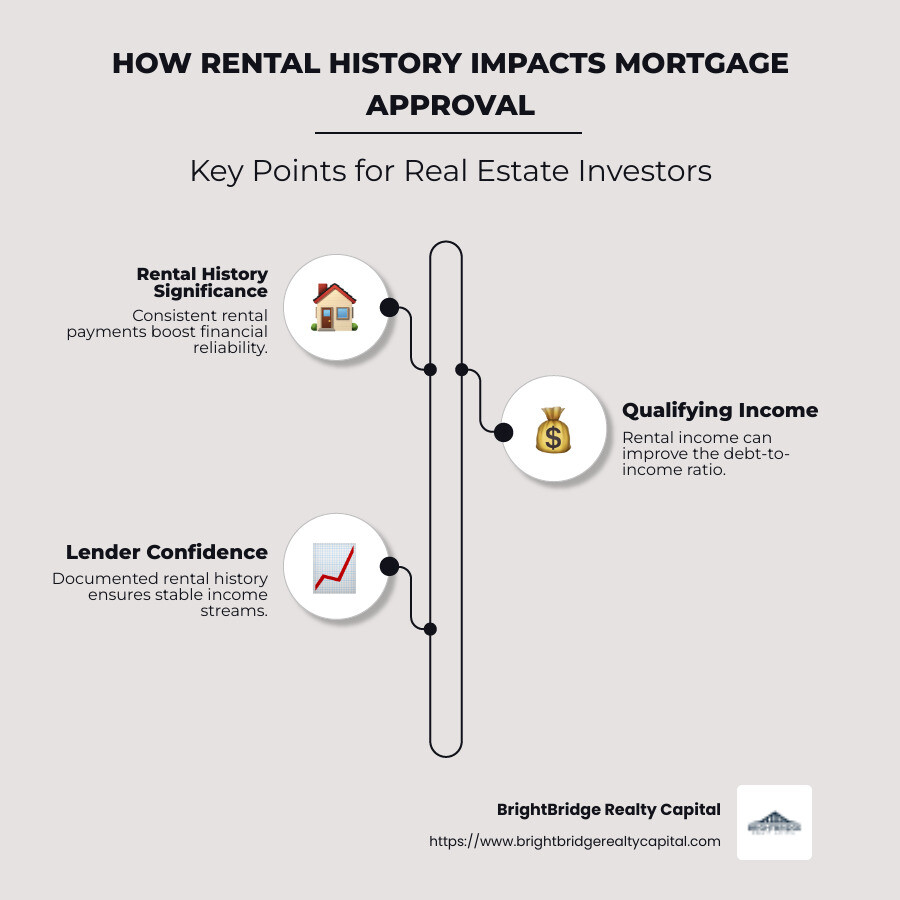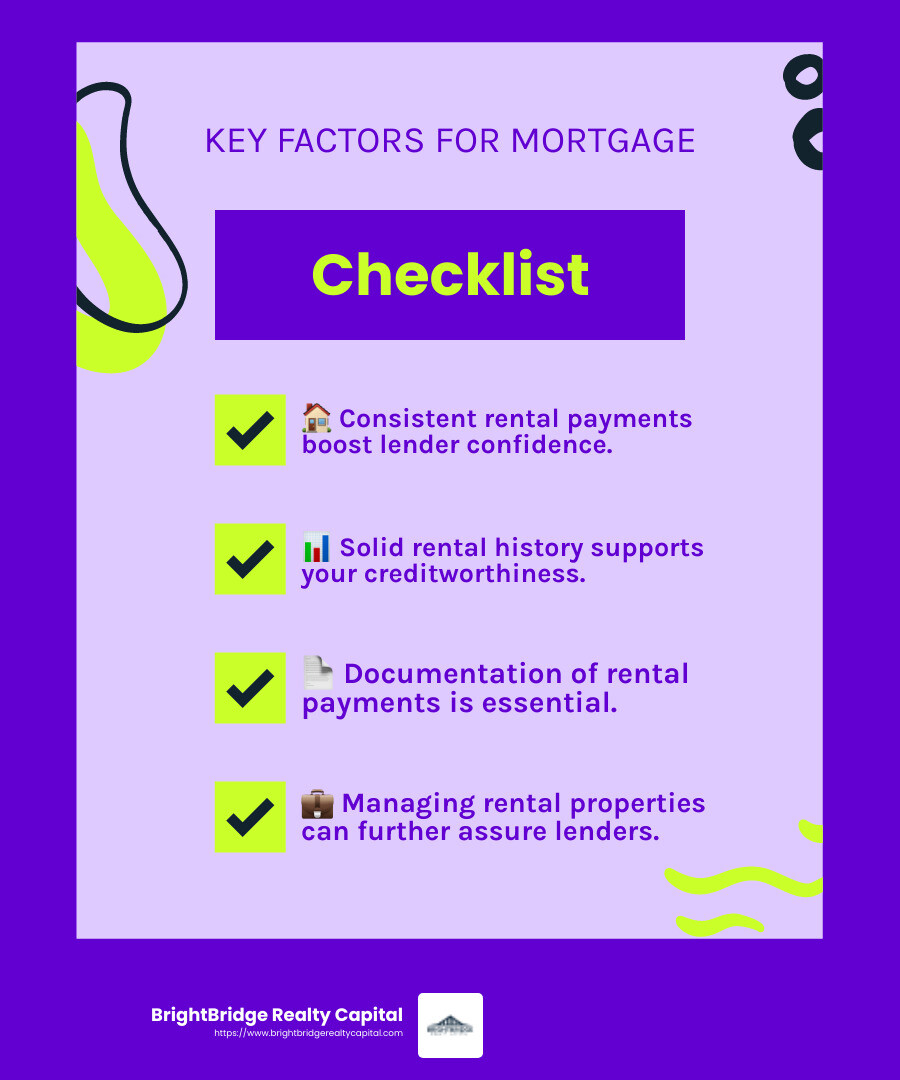The Rent Factor: How Lenders View Your Rental History

Home loans that take rent into consideration are pivotal for many real estate investors navigating the mortgage landscape. Lenders increasingly recognize rental history as a valuable asset when evaluating mortgage applications. Here’s how rental history impacts mortgage approval:
Rental History Significance: Consistent rental payments can reinforce your financial reliability, making you more attractive to lenders.
Qualifying Income: Rental income can be a primary income source for many investors, influencing their debt-to-income ratio positively.
Lender Confidence: Proven rental history, especially documented through tax returns, assures lenders of stable income streams.
Real estate investors often face problems with traditional loan processes, yet understanding how to leverage rental income opens new doors. Navigating these possibilities efficiently is essential, especially when aiming to expand your property portfolio within a market.

Home loans that take rent into consideration terms to learn:
Understanding Rental History in Mortgage Applications
When it comes to securing a mortgage, your rental history can play a crucial role. Lenders look at several factors to gauge your financial reliability, and rental payments are a big part of the equation.
Rental Payments and Credit Score
Consistent rental payments not only keep a roof over your head but also build a strong case for your financial responsibility. Lenders see this as a positive indicator of your ability to manage monthly obligations.
Your credit score is another key piece of the puzzle. While rental payments themselves might not directly impact your credit score, a history of on-time payments can indirectly support your creditworthiness. Lenders often weigh this history alongside your credit score to assess risk.
Building Lender Confidence
Lenders want assurance that you can handle mortgage payments. A solid rental history provides that confidence. It shows that you have a track record of meeting financial commitments regularly and can be trusted with a larger loan.
Moreover, if you've been a landlord, your ability to manage rental properties successfully can further reassure lenders. This experience not only underscores your financial acumen but also highlights your capability to maintain a steady income stream through rental income.
The Role of Documentation
Documentation is key. Lenders typically want to see proof of past rental payments, often through tax returns or bank statements. This documentation helps them verify your rental income and assess its stability over time.

In today's competitive mortgage market, leveraging your rental history can make a significant difference. With the right documentation and a solid credit score, you can improve lender confidence and improve your chances of mortgage approval.
Understanding these factors is essential as you prepare your mortgage application, especially if you're aiming to expand your real estate investments.
Next, we'll explore how rental income is calculated for mortgage approval, focusing on gross rent, vacancy allowance, and adjusted income.
Home Loans That Take Rent into Consideration
When you're eyeing a mortgage, rental income can be a game-changer. Many home loans that take rent into consideration offer a pathway to mortgage qualification, especially for those who rely on rental income as a primary income source.
Fannie Mae and Rental Income
Fannie Mae plays a pivotal role in this landscape. They allow lenders to consider rental income as part of the borrower's total income, which can be crucial for mortgage qualification. This is particularly beneficial for investors who might not have a traditional salary but have a steady stream of rental income.
Fannie Mae guidelines enable lenders to use up to 75% of the rental income from investment properties to qualify borrowers. This percentage accounts for potential expenses and vacancies, providing a more realistic view of the income that can be used to service the mortgage.
Mortgage Qualification with Rental Income
To qualify for a mortgage using rental income, lenders will require documentation to verify this income. This typically includes tax returns showing rental income reported to the IRS, as well as lease agreements for existing tenants.
Lenders may also conduct an appraisal to estimate the subject property’s potential rental income. This helps in assessing whether the projected rental income is realistic and sufficient to support the mortgage payments.
In some cases, if you have a tenant in place, providing copies of recent rent checks and a signed lease agreement can further support your application.
Next up, we'll dive into the nitty-gritty of calculating rental income for mortgage approval, focusing on gross rent, vacancy allowance, and adjusted income.
Calculating Rental Income for Mortgage Approval
When you're trying to get a mortgage, understanding how lenders calculate rental income is key. Lenders have specific methods to determine how much of your rental income can be used to qualify for a mortgage.
Gross Rent
Gross rent is the starting point. It’s the total amount you expect to receive from renting out your property each month. This figure is usually determined by an appraiser's estimate of the market rent for the property. For instance, if an appraiser estimates that your property can rent for $3,000 a month, that's your gross rent.
Vacancy Allowance
Next, lenders account for potential vacancies and maintenance costs by applying a vacancy allowance. This is typically set at 25% of the gross rent. This means they assume that, on average, 25% of the rental income will be used for vacancies and maintenance. So, for a property with a gross rent of $3,000, the vacancy allowance would be $750.
Adjusted Income
After accounting for vacancies and maintenance, lenders arrive at the adjusted income. This is the amount of rental income they consider when evaluating your mortgage application. Using our example, you'd subtract the $750 vacancy allowance from the $3,000 gross rent, leaving you with an adjusted income of $2,250.

This adjusted income is what lenders use to decide if you can afford the mortgage payments. It helps them determine your debt-to-income ratio and assess your overall financial health.
Understanding these calculations can make a big difference when applying for a mortgage, especially if you're relying on rental income to qualify. Up next, we'll explore the different types of loans available for rental properties, from conventional loans to FHA and VA loans.
Types of Loans for Rental Properties
When it comes to financing rental properties, there are several home loans that take rent into consideration. Each type of loan has its own benefits and requirements, making it important to choose the right one for your needs.
Conventional Loans
Conventional loans are the most common type of mortgage. They are offered by banks, credit unions, and mortgage brokers. These loans generally require a good credit score and a down payment, which can be less than 25% if your credit is strong. Conventional loans must meet Fannie Mae or Freddie Mac guidelines, which can allow up to 10 mortgages per borrower. However, some banks may have lower limits.
FHA Loans
If you're looking for a loan with a lower down payment and credit score requirement, an FHA loan might be a good option. These loans are insured by the Federal Housing Administration and are especially popular among multifamily property investors. To qualify, you’ll need to live in one of the units as your primary residence for at least a year. FHA loans also let you use rental income from other properties you own to help qualify.
VA Loans
VA loans are a fantastic choice for veterans, active-duty service members, and eligible spouses. Backed by the Department of Veterans Affairs, these loans often have no minimum down payment or credit score requirement. You can purchase up to seven units, but one must be your primary residence. This makes VA loans an attractive option if you qualify.
Portfolio Loans
For investors with multiple properties, portfolio loans can be a smart choice. These loans are offered by the same lender for different properties, often with a "group discount." While each property has its own loan, terms like interest rate and down payment can be customized. Just be aware that portfolio loans might come with higher fees and prepayment penalties.
Blanket Loans
Want to finance several rental properties with a single loan? Consider a blanket loan. This option is ideal for investors looking to purchase multiple properties or refinance existing ones. Blanket loans are usually cross-collateralized, meaning each property acts as collateral for the others. However, you can request a release clause to sell one property without refinancing the rest.
Choosing the right loan can greatly impact your investment strategy and financial success. In the next section, we'll answer some frequently asked questions about using rental income to qualify for a mortgage.
Frequently Asked Questions about Rental Income and Mortgages
Can I use future rental income to qualify for a mortgage?
Yes, you can use future rental income to qualify for a mortgage. Lenders often consider this income, especially if you're planning to buy an investment property. They look at the projected rental income to assess if it will cover the mortgage payments.
To use future rental income, you'll need an appraisal that estimates the potential rent. This is called "subject income." Lenders typically use about 75% of this estimated rent to account for vacancies and maintenance costs. This means if the appraiser estimates the rent to be $2,000 per month, the lender will consider $1,500 of it.
How does rental income affect my debt-to-income ratio?
Rental income can significantly impact your debt-to-income ratio (DTI), a key factor in mortgage approval. Your DTI compares your monthly debt payments to your gross monthly income. A lower DTI means you have a better chance of getting a loan.
When you include rental income, it can lower your DTI. For example, if your monthly mortgage payment is $3,000 and your adjusted rental income is $2,250, the rental income reduces your mortgage debt. This makes your DTI more attractive to lenders, increasing your chances of approval.
What are the requirements for using rental income in mortgage applications?
To use rental income in your mortgage application, you need to meet certain requirements. Lenders often look for:
Property Management Experience: You should have at least one year of experience managing rental properties. This shows lenders you can handle the responsibilities that come with being a landlord.
Rental History: A solid rental history can boost lender confidence. If you have a history of timely rental payments, it demonstrates reliability.
Documentation: Be prepared to provide proof of rental income. This includes tax returns, bank statements, and lease agreements. If you don't have an existing tenant, you'll need an appraisal to estimate potential rent.
Meeting these requirements can improve your chances of using rental income to qualify for a mortgage. In the next section, we'll explore how BrightBridge Realty Capital can help customize your financing options for fast closings.
Conclusion
At BrightBridge Realty Capital, we understand the unique challenges and opportunities that come with financing rental properties. Our goal is to offer customized financing solutions that align with your investment strategy. Whether you're a seasoned investor or just starting out, we tailor our services to meet your specific needs.
One of our standout features is our ability to provide fast closings. We know that timing is crucial in real estate, and our streamlined process ensures that you can secure funding quickly—often within a week. By cutting out intermediaries, we offer competitive rates and a seamless experience, getting you from application to funding without unnecessary delays.
When it comes to home loans that take rent into consideration, we are your trusted partner. Our expertise in evaluating rental income and understanding its impact on mortgage qualifications sets us apart. We work closely with you to maximize your rental income potential, aiding in mortgage approval and enhancing your investment returns.
For more information on how we can assist you with your rental property financing needs, visit our BrightBridge Realty Capital service page. Let's bridge the gap in your real estate financing journey together.


